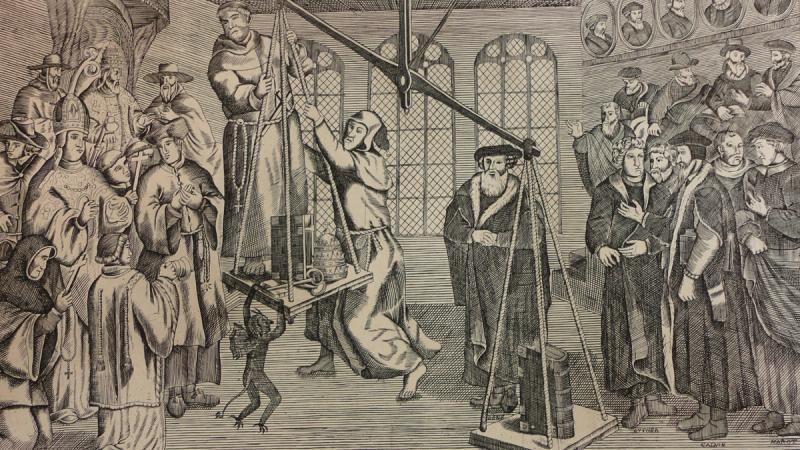Throughout the twentieth century, a number of historians have proposed that the period of systematization which followed the Protestant Reformation, especially in the seventeenth century, was one of theological collapse. It is contended that the traditions following Luther and Calvin departed from the purer Gospel-centered theology of these thinkers for a reversion to a medieval synthesis of faith and reason. This has resulted in a “Luther versus the Lutherans” mentality in churches of the Augsburg Confession, along with the popular “Calvin versus the Calvinists” notion within the Reformed tradition. This purported divergence between the reformers and those who are often referred to as the Protestant scholastics has not, however, been universally acknowledged. Writers such as Richard Muller and Robert Preus have challenged such ideas through a thorough study of the thought and method of the scholastic authors in the Reformed and Lutheran traditions respectively.[1] In my recent book, Prolegomena: A Defense of the Scholastic Method, I argue for continuity between the reformers and their heirs in the period of Confessional definition and systematization. What I offer here is a summary of my major argument.
At the core of these debates, at least within the realm of Lutheran thought, is the use of classical philosophy in theological formulation. Church historian Adolph von Harnack proposed what is often referred to as the Hellenizing-thesis, wherein it is contended that Christianity at its root was a Jewish movement.[2] Throughout a period of development following the writing of the New Testament, the Hebraic thoughts of the first Christians were synthesized with Greek ideas, as the message of Jesus spread throughout the Roman world. This resulted in the formation of a theology which departed from Jewish assumptions about God and nature that developed further in the medieval period, resulting in the Aristotelian-Christian synthesis of St. Thomas Aquinas. Following this line of thought, Luther scholars of the early twentieth century such as Karl Holl—along with others involved in the Luther Renaissance—argued for Luther’s discontinuity with the Thomistic medieval tradition, regaining a more Scriptural approach to doctrine.
With the assumptions of the Hellenizing thesis, it is argued that as Protestants began to use language borrowed from Aristotle, such as the substance/accident division, or the four causes, they reverted back to the Hellenistic synthesis. This assertion leads to a number of questions which merit comprehensive answers. Two of the primary questions are answered here, in brief. The first of those is whether Luther’s thought is opposed to classical philosophy as such, being consistent with perhaps some other philosophical movement (existentialism, linguistic philosophy, or relational ontology being some options offered), or if the ideas of the Greeks can be used in some manner in a way consistent with the reformer. The second question is exactly what identifies a Confessional Protestant movement. Are Lutherans and Calvinists confined exclusively to the theology of Luther and Calvin, or is the appropriation of their ideas by later thinkers and confessions of faith the identifying factor?
Regarding Luther, one need not make an argument that he was, in many ways, opposed to the Aristotelian method as used by Aquinas and his late medieval interpreters (namely, Cajetan), as such is apparent from even a cursory read of the reformer. One must ask, however, exactly what it was in the medieval scholastic tradition that Luther rejected so adamantly. As one might expect from Luther, the core of this issue is found in the doctrines law and gospel. A read through his 1517 Disputation Against Scholastic Theology (his harshest critique of scholasticism) demonstrates that it is a concern for an Augustinian view of both original sin and the sufficiency of grace which guides his critique.[3] The primary targets, as he names them, are the nominalists of the late medieval period, including: Ockham, Scotus, and Biel. Luther argues, in opposition to such thinkers, that the natural human is unable to love God apart from grace, as the will has been entirely corrupted by the Fall. Such criticisms do not apply to earlier scholastics like St. Anselm or St. Thomas Aquinas.
This is not to say, however, that Luther lacks criticism of Aquinas. In thesis fifty, Luther states in his typical blunt fashion: “the whole Aristotle is to theology as darkness is to light.” The problem with Aristotle, for Luther, is twofold. First, Aristotle’s ethics were used in the medieval era to promote a doctrine of works-righteousness, wherein active virtue constituted one’s righteousness coram deo (thesis 41). Second, syllogistic reasoning cannot be the all-expansive manner of knowing God who is shrouded in mystery to the limited human creature (thesis 47). Does all of this mean, then, that metaphysics as such is opposed to Luther’s thought? There are significant reasons to think that such is not the case.
The first two points come not from Luther’s own statements on philosophy directly, but in his affirmation of those who use classical philosophy in a strong manner. The reformer often cites his own influences as medieval mystics such as Johann Tauler, Bernard of Clairvaux, and the anonymous author of the Theologia Germanica.[4] Each of these thinkers is profoundly impacted by Neoplatonism in various ways—especially Tauler. Yet, despite the use of strong realism in their spirituality, Luther never offers a word of criticism on that point. This is a notable contrast to his continual criticisms of both his nominalist teachers and the Thomistic tradition. Second, Philip Melanchthon utilized Aristotelian categories heavily in his writing—most notably, the four causes. Melanchthon even spoke positively of Aristotle’s ethics, while strongly distinguishing his view from those at the heart of Luther’s criticisms who conflated civic virtue with justifying righteousness. Luther, again, continually affirmed Melanchthon’s writings and methodology, even while not using such categories himself. It does not appear that the reformer viewed the reception of philosophy in his student as contradictory to his own ideas.
The final piece of evidence that Luther is not opposed to any essentialist metaphysic as such is from his own hand. In his 1518 Heidelberg Disputation, which is often taken as an example of Luther’s antithesis to classical philosophy, Luther continues his attack on Aristotle, not by a denial of realism, but with an affirmation of Platonism. Luther writes:
That the philosophy of Plato is better than the philosophy of Aristotle appears from this, namely, that Plato always depends upon the divine and immortal, separate and eternal, insensible and intelligible, from whence he also recommends that singulars, individuals, and sensible things be abandoned because they cannot be known on account of their instability.[5]
Though the theological theses of the Disputation have been heavily cited, the philosophical theses, and in particular, Luther’s explanation of those theses, has been an oft-neglected piece of writing in scholarship surrounding Luther’s relation to reason. And here, precisely where Luther could have rejected realism in a strong way, he instead affirms a stronger realist view than that of Aristotle.
The second question to be addressed then, in light of this, is precisely what defines someone as a Lutheran. If Luther himself and the later authors of that tradition really do hold to such contradictory approaches, especially regarding philosophy, then one is left with two different theologies to decide from: that of Luther, and that of the Book of Concord. It is important to discuss, regarding both the Formula of Concord and the seventeenth century orthodox thinkers, both the use of and limits of philosophical discourse. Regarding such limits, these later thinkers are in essential agreement with the Luther of the Disputation Against Scholastic Theology. With Luther, these authors explicitly reject the notion of any principle of active righteousness, whether that of Aristotle’s virtue ethics or something else, as having any relation to one’s justification before God.[6] Similarly, they strongly affirm that reason and syllogism have significant limits. Logical argumentation is used to defend God’s existence and basic attributes, but such an approach is decidedly not taken with regard to God’s triunity or to the gospel itself. As Aristotle, then, is reintroduced into theological discourse, this is done within the limits that Luther set. While Luther may never be vindicated as some kind of Thomistic thinker, when later authors reintroduce some of Aquinas’ categories, they do not do so in a way which is an outright contradiction of Luther’s thought.
Even if one were to determine some significant contradiction between the reformer and the later tradition, while of historical significance, this should not alter the confession of the Lutheran church itself. There is a reason why the Lutheran tradition did not simply adopt Luther’s corpus as a confessional standard, recognizing that no such burden of complete doctrinal purity should be placed upon any singular figure. Confessions of faith are written in conversation with multiple parties through debate, clarification, and eventual acceptance by the church. While those confessions should be read both with preceding figures and those flowing out of that tradition in view, it is the confessions themselves which determine the doctrinal boundaries of that church tradition. For the Lutheran then, the more significant question should be that which is stated in the 1580 Book of Concord.
There is a specific article within the Formula of Concord that addresses categories of Aristotelian metaphysics. A controversy erupted over the question as to whether sin was, after the Fall, an accidental or substantial property of humanity. Matthias Flacius argued that the human essence post-lapsus was to be identified with sin. The Formula affirmed, against this view, that the human essence remains after the Fall, while original sin is an accidental property. Rather than rejecting Aristotle’s metaphysics on this point, such distinctions are instead affirmed as “indisputable truth” (FC SD I.57). Classical metaphysics cannot, for the Confessional Lutheran, be entirely rejected. It is my contention that there is profound continuity between Luther and the tradition arising from his name. The church today would do well to engage more significantly in the writers of the seventeenth century orthodox period who provide extensive clarification, defense, and exegetical rigor to the truths of the Reformation, and that includes an adoption of some of their fundamental philosophical claims.
Jordan Cooper is the executive director of Just and Sinner, the host of the weekly Just and Sinner Podcast, and an adjunct professor of Systematic Theology at the American Lutheran Theological Seminary. He is also the founder of the Weidner Institute, which hosts both online courses and seminars for continuing theological education for both clergy and laity. He has authored several books, including his most recent Prolegomena: A Defense of the Scholastic Method.
[1] Richard A. Muller Post-Reformation Reformed Dogmatics: The Rise and Development of Reformed Orthodoxy, ca. 1520 to ca. 1725, Vol. 1; Robert D. Preus, The Theology of Post-Reformation Lutheranism: A Study of Theological Prolegomena.
[2] Adolph von Harnack. History of Dogma. Translated by Neil Buchanan. (Boston: Little, Brown, and Co., 1899).
[3] Martin Luther, “Disputation against Scholastic Theology,” in Luther’s Early Theological Works, 251-273.
[4] Bengt R. Hoffman, Theology of the Heart: The Role of Mysticism in the Theology of Martin Luther.
[5] This translation is from: Eric Parker. “The Platonism of Martin Luther” Calvinist International.
[6] For a contemporary treatment of this question, see: Joel Biermann, A Case for Character: Towards a Lutheran Virtue Ethics.
Blog Banner Image: “The Scale” by Martinus Beusecom, 17th Century. Facsimile from original in the International Museum of the Reformation, Geneva. Public Domain {{PD-US}} by age, resized by MR.




